Fortune Street: Difference between revisions
m (Reverted edits by 70.243.160.124 (talk) to last revision by TheFlameChomp) |
|||
| Line 490: | Line 490: | ||
*''[[Super Mario Sunshine]]'': Delfino Plaza returns as a ''Mario'' series board. A remix of its original theme is the main theme of this board. | *''[[Super Mario Sunshine]]'': Delfino Plaza returns as a ''Mario'' series board. A remix of its original theme is the main theme of this board. | ||
*''[[Wario World]]'': Wario mentions the [[Black Jewel]] in one of his quotes, who was the main antagonist of that game. | *''[[Wario World]]'': Wario mentions the [[Black Jewel]] in one of his quotes, who was the main antagonist of that game. | ||
*''[[ | *''[[Mario Kart: Double Dash!!]]'': Peach's quote in the Mario Circuit map is "I'm going to double-dash my way to victory! Good luck keeping up with me! Tee hee!" This references the two driver mechanic featured in said game. | ||
*''[[Mario Party 6]]'': Yoshi's artwork from this game is reused. | *''[[Mario Party 6]]'': Yoshi's artwork from this game is reused. | ||
*''[[Super Mario 64 DS]]'': Bowser's artwork from this game is reused. | *''[[Super Mario 64 DS]]'': Bowser's artwork from this game is reused. | ||
Revision as of 17:18, September 28, 2018
Template:Infobox Fortune Street (known as Boom Street in Europe and Oceania) is a Wii game developed by Square Enix. It is a follow-up to the Nintendo DS game Itadaki Street DS and is the first Itadaki Street title that was released outside of Japan.
This game was able to be played over Nintendo Wi-Fi Connection; however, the service was terminated on May 20, 2014, making this game no longer playable online. Also, mainly due to this game's Wi-Fi compatibilities, it is impossible to transfer the save data to an SD Card.
Gameplay
This game can be played with up to four players. If game data can't be saved or won't be saved, only offline multiplayer is available (though Out of Lunch can be used to mimic a single player game. Every player can be CPU players by doing this). When playing multiplayer offline, records aren't saved. Also, when playing multiplayer offline, players can decide if each player should have their own Wii Remote, or that players share one Wii Remote. When using the latter option, players will press one of the three buttons: ![]() ,
, ![]() and
and ![]() during an Auction to make a bid, and are ordered based on where characters appear in the Auction window.
during an Auction to make a bid, and are ordered based on where characters appear in the Auction window.
At the start of a game, all players use number machines to determine the turn order, with the highest number going first (note that it is possible for two numbers on the number machines to be the same, if so then the tying players use the number machines again). The only exceptions are the tutorial, where the human player always goes first; and in Custom Rules, should the Order of play be set to As picked, where it makes P1 goes first, then P2, then P3 then P4.
Four players (excluding the play system in Tutorial mode, where only three characters play) take turns by rolling dice to go around the board and buy shops. Some squares involve special attributes, such as Take-a-break squares (when a character lands there, all of his or her shops will close until the player's next turn) and Venture squares (like a Chance space in Monopoly). Players also have the ability to invest money in their own shops when they land on them (a maximum of 999 per turn). Scattered around the board are four suits (Heart, Club, Diamond, and Spade); if the player collects all of them and returns to the Bank (also the starting space) they get a promotion. When a player gets a promotion, they get a fixed amount for their salary, plus a shop bonus which is based off 10% the sum of all the player's shop value, as well as a promotional bonus (extra money given to the player that increases as they level up). The player's level also goes up when they get a promotion.
The player wins by increasing their net worth to at least the target amount (usually determined by the game, if on Custom though, this can range between 6,000 and 999,000 in increments of 1,000) and returning to the bank first (in the Practice Boards, the target net worth for Easy Rules and Standard Rules are 5,000 G and 8,000 G respectively). Net worth is the total combined amount of ready cash and value in stocks and shops and can be increased by having other players land on their shops and buying multiple shops in an area or investing in stocks and owned shops to increase the stock price. If the player runs out of ready cash at any point, they must sell either stocks or a shop to try and get out of debt; any shops sold for cash are auctioned (the winning bid gets paid to the bank). Note that the bank only offers 75% of the shop price to a player if they are in debt. Also, if a player auctions a shop from "Manage Shops" or gets Venture Card #74, the highest bid is credited to the original owner. If the player's net worth goes below zero, then they go bankrupt; all their assets are sold off if any remain and they are automatically eliminated from the game. The player with the highest net worth automatically wins if the bankruptcy limit is met (although in a very rare case should two or more players have the same highest net worth, the player that goes later in the turn order wins). In Tour mode, the game ends once one player goes bankrupt, in Custom mode, this can be set to when two players go bankrupt or to have a last-man-standing rule.
There are two different ways to play: the Easy rules and the Standard rules.
Standard Rules
In the Standard rules, the board is divided into several color-coded districts and includes a stock market. If the player has more than one shop in a district, both shops expand, meaning the shop's value, prices, and max capital (the amount of money that can be invested into a shop) will all increase. Owning all the shops in a district results in a monopoly, which greatly expands all the shops in that district. There is usually 4 shops in a district.
Stocks can be purchased at the bank or a stockbroker square, but only 99 can be bought in one district at one given time; despite that, stocks can be sold at any time before a player's turn. Stocks can increase or decrease in value at any time. An increase of shop values or a large purchase of stock at one time will increase the stock value in that district. Contrariwise, a decrease of shop values or a large sale of stock at one time will decrease the stock value in that district. Like shops, stocks are assets, and therefore, they will not decrease net worth when purchased. When stocks increase or decrease in value, only the player's net worth will be affected. This is dependent on two factors: how many stocks owned in that district, and by how much the stock value fluctuates. For example, if a district's stock value increases by 5G, a player who owns 200 stocks in that same district will gain a 1000G bonus in net worth.
Exclusive to Standard rules are vacant plots. These spaces allow a player to build upon the land. A vacant plot can be changed, or 'renovated', at any time before the player rolls the dice block. The following buildings can be built on vacant plots:
- Checkpoint - Any opponent who passes or lands on this space has to pay the indicated toll; afterwards the toll increases by 10G per pass; if the player who owns the checkpoint lands on this space, they can invest in any other shop they own.
- Circus Tent - Any opponent who lands on this space has to pay the indicated price; if the tent owner lands on this space, they can expand the circus like a shop (Starts with a price of 100G, and after expanding (3 times MAX) it goes to 500G, 1000G, and 2000G).
- Balloonport - Any opponent who lands on this space has to pay the indicated price; if the port owner lands on this space, they can travel to any space at no charge.
- Tax office - Any opponent who lands on this space has to pay 10% of their net worth to the owner; if the office owner lands on this space, they gain a 5% net worth bonus.
- Home - Any opponent who lands on this space must pay 30 gold times the owner's level to the owner; if the homeowner lands on this space, every other player is forced to congregate at that space.
- Estate Agency - This acts like a 'take a break' space to any opponent who lands on this space; if the agency owner lands on this space, they can buy any unowned shop as long as at least one shop is unpurchased.
- Three-Star Shop - The player can build a shop with a starting value of 1000G; this acts like any other shop space until it is renovated. If another player lands on this space they must pay for goods; if the owner lands there, they can invest in any shop they own.
Three-Star Shops cost 1000G to build; everything else costs 200G. A surcharge of 150G is imposed to renovate an existing building.
Easy Rules
In Easy rules, there are no stocks, no vacant plots, and no districts, making the game more accessible for new players. To expand shops further, the player will have to buy adjacent shops in a row. The row's maximum potential length depends on its location on the board since suit squares, venture squares, the arcade, and the bank divide certain sections of the board.
Salary Calculation
A player's salary from a promotion is calculated as follows:
Formula
| Type | Calculation |
|---|---|
| Base salary | B |
| Promotion bonus | P × L |
| Shop bonus | S ÷ 10 (rounded down) |
| Total | Sum of the three values above |
Variables
| Variable | Description |
|---|---|
| B | The fixed amount the player gets. |
| P | An amount that controls the amount the player gets corresponding to their level. |
| L | The player's level before promotion. |
| S | The sum of all the player's shop value. |
Squares
- Shops - The most common squares, these are the main focus of Fortune Street. A shop can be purchased as long as the player has enough assets (sum of ready cash and stocks) in possession. Purchasing or investing in a shop doesn't decrease net worth, but it costs ready cash to do so.
- Venture - This square allows a player to choose a card from a random selection of 64 cards. There are 128 cards in total, but 23 of them are exclusive to Standard rules. As such, only 105 cards appear in the Easy rules. A player will also receive gold by lining up four or more cards with their color (10 gold per row) if they line up a whole row they gain 200 gold.
- Suit - These squares hold one of the four suits. If a player lands directly on it, it acts like a Venture square.
- Changing Suit - This is just like a Suit space, except it cycles through all four suits as players pass it.
- Backstreet - Either a warp space or a Warp Pipe, these squares take the player to the connecting square of the same color.
- Take-a-break - This square makes the player's shops close for one turn.
- Vacant Plot - Exclusive to Standard rules, these squares allow a player to build upon the land. In Standard rules Free Play, the amount of vacant plots can be set in the custom rules.
- One-Way Doors - In boards like Robbin' Hood Ruins and Bowser's Castle, these doors take the player to a different part of the board.
- Boon - Allows the player to receive a 20% commission on all profits made until their next turn.
- Boom - Allows the player to receive a 50% commission on all profits made until their next turn.
- Arcade - This square allows the player to play a minigame.
- Bank - Players who pass the bank can buy stocks in any district. If a player passes by the bank square with all four Suits, they receive a promotion.
- Cannon - Only appears on some boards; allows the player to be blasted to any other player's location.
- Roll-on - Allows the player to roll again.
- Stockbroker - Similar to the bank (except that it must be landed on), allows the player to buy stocks in any district.
Characters
All twenty-two characters from Itadaki Street DS return, with the addition of four new characters for a grand total of twenty-six. Players can also use and customize their Miis in the game.
Miis are the only playable characters in single-player and online mode; in multiplayer offline, players can also choose between the Mario and Dragon Quest characters as well. Each computer character is ranked from S, A, B, C, D in terms of difficulty (S being the highest, and D being the lowest) which means each computer character has a predetermined difficulty. If the player beats either all the Easy Tour boards or all the Standard Tour boards, they will have the ability to switch the computers' difficulty from S rank to their normal rank.
Characters marked with an asterisk (*) are unlockable.
Playable in Multiplayer Mode
Mario franchise
| white | white | white | white | white | white | white | |||||||
|---|---|---|---|---|---|---|---|---|---|---|---|---|---|
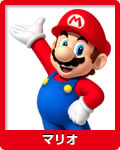 Rank A |
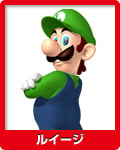 Rank C |
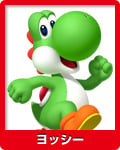 Rank B |
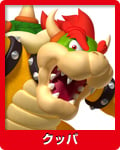 Rank A |
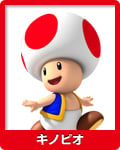 Rank C |
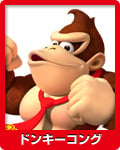 Rank D |
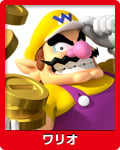 Rank B | |||||||
| white | white | white | white | white | whitewhite | ||||||||
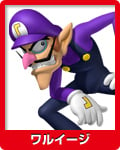 Rank C |
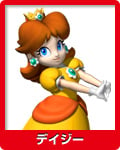 Rank C |
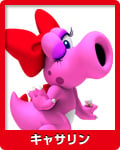 Rank D |
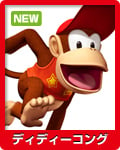 Rank D |
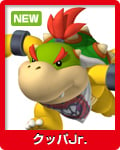 Rank A |
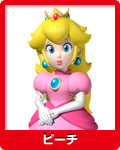 Rank S | ||||||||
Dragon Quest series
| Template:Color-link-piped | white | white | white | white | white | white | |||||||
|---|---|---|---|---|---|---|---|---|---|---|---|---|---|
 Rank D |
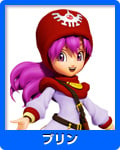 Rank C |
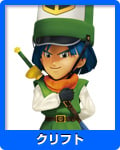 Rank C |
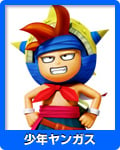 Rank D |
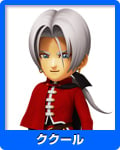 Rank A |
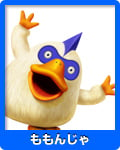 Rank C |
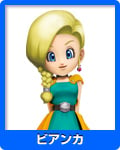 Rank B | |||||||
| white | white | white | whitewhite | whitewhite | Template:Color-link-pipedwhite | ||||||||
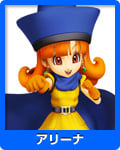 Rank B |
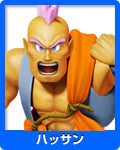 Rank C |
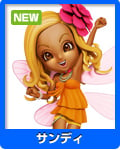 Rank B |
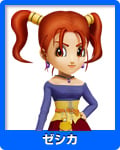 Rank S |
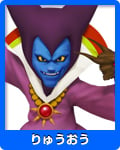 Rank S |
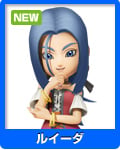 Rank S | ||||||||
Unlocking Criteria
| Character | Unlock Method |
|---|---|
Other
Non-Playable
- Heal Slime
- Goodybag
- She-Slime
- Metal Slime
- Rockbomb
- Magmalice
- Mottle Slime
- Malroth
- Lakitu
- 8-bit Goomba
- 8-bit Koopa
- 8-bit Buzzy Beetle
- Toads
- Yoshis
- Shy Guy
- Pianta
- Noki
- Boo
- Bob-omb
- Bullet Bill
- Chain Chomp
- Luma
- Dry Bones
- Thwomp
Boards
Super Mario Tour
Dragon Quest Tour
Special Tour (Unlockable Boards)
Unlocking Criteria
| Board | Unlock Method |
|---|---|
Minigames
- Round The Blocks – This is essentially a game of slots. The player can get three 7s in a row and get 500 gold coins (the game's currency, shortened as gold or simply g ) times their level, get three warp pipes or wings (depending on the board, Mario or Dragon Quest) in a row to warp, three stock icons to get a set amount of stocks in one district if playing standard mode, three Suit Yourself Cards (these are like wild cards; they can act as any suit the player does not have. Owning one Suit Yourself Card means the player could only collect three suits and still get promoted) in a row to get one of the afore-mentioned cards, or get 3 mushrooms or Slimes (depending on the board) to get 50g times the players level.
- Memory Block – The player chooses from a number of boxes to get either a 1-Up mushroom which makes all of their shops increase by 10%, a card with a coin which gives the player 10G multiplied by their level, a Suit Yourself Card, 5 stocks in a district, or a card with Bowser's face on it which makes all of their shops decrease by 5%. Sometimes, all of the blocks will be the same size, so there is a chance that the player may get a Bowser card easily. That happens to first place the most.
- Dart of Gold – The player throws a dart at a wheel that has different items that can help or hurt players. Once the player throws the dart and hits an item (a treasure chest containing 100G times a player's level, a gold coin worth 10G times a player's level, three gold coins worth 30G times a player's level, stocks, a 1-Up Mushroom that will increase the target's shop values by 5%, Bowser, that will decrease the target's shop values by 5 %, or a Suit Yourself Card), throw another dart at a different wheel that has all the player's faces on it, as well as a space that has everyone's faces on it. If the dart hits one player's space then they get the prize/punishment but if the dart hits the space with all the faces, then everyone gets the prize/punishment.
- Slurpodrome – Players chose different colored Slimes to see which one will make it to the end first. Along the way, the treasure chest will open and reveal one of many things: a gold coin worth 20G, a Mimic which knocks the Slime out of the race, a Munchie which does nothing to affect the race, or a seed of agility which increases the Slime's speed. Sometimes, Rockbombs will roll onto the track and knock a Slime out of the race. Whoever gets to the end first wins the most money (100G times the level of the starting player plus any coins they collect), however since players collect coins along they way, all players will get some money (depending on the number of chests hit), if they collected at least one coin. Rewards are doubled for easy rules.
Venture Cards
When a player lands on a Venture Space or a Suit Space, the player must pick a Venture Card. When a player picks a card, the following will happen depending on the number (note that text marked in bold are exclusive to Standard Rules while text marked in italics are optional):
- Adventurous turning point! You can choose which way to move on your next go, (player's name).
- Venture on! Roll the die again and move forward.
- Venture through space! Zoom over to any non-venture, non-suit square you like!
- Moneymaking venture! Roll the die and get 40 times the number shown in gold coins from the player in first place!
- Venture through space! Zoom over to any shop or vacant plot!
- Venture through space! Zoom over to any venture or suit square!
- Special bonus! Your shops all grow by 7%!
- Venture on! Everyone's shop prices increase by 30%! Now roll the die and move again.
- Venture on! Everyone's shops close for the day! Now roll the die and move again.
- Venture on! Everyone's shop prices cut in half! Now roll the die and move again.
- Moneymaking venture! Roll the die and get 11 times the number shown in gold coins from all other players!
- Capital venture! You can invest capital in any of your shops.
- Misadventure! The values of all your shops drop by 13%!
- Misadventure! You give everyone 30G each!
- Moneymaking venture! Roll the die and get 50 times the number shown in gold coins from the bank!
- Random venture! Shops expand in three districts picked at random!
- Special bonus! You receive half of your salary!
- Misadventure! The bank is forcibly buying you out! You're compelled to sell a shop for only twice its value.
- Price hike venture! Your shop prices go up by 30% until your next turn.
- Revaluation venture! You can expand any one of your shops by 20%.
- Random venture! You receive 20 stocks in a district picked at random!
- Cashback venture! You can sell a shop back to the bank for twice its shop value.
- Revaluation venture! You can expand any one of your shops by 50%.
- Misadventure! The bank is forcibly buying you out! You're compelled to sell a shop for only 200G more than its value.
- Misadventure! Your shop prices halve until your next turn!
- Lucky venture! You get a big commission until your next turn!
- Special bonus! You receive 27 times the number of shops you own in gold coins from the bank!
- Cameo adventure! A goodybag appears!
- Freebie! Take a Heart!
- Venture on! All shops charge a 100G flat rate! Now roll the die and move again.
- Random venture! Shops expand by 10% in a district picked at random!
- Random venture! Shops expand by 20% in a district picked at random!
- Cashback venture! You can sell a shop back to the bank for three times its shop value.
- Dicey adventure! Roll 1/3/5 and your shops close for the day. Roll 2/4/6 and everyone else's shops close.
- Stock venture! You can sell stocks you own at 35% above the market value.
- Capital venture! You can pay 100G for the chance to invest in your shops.
- Random venture! Shops expand by 30% in a district picked at random!
- Stock venture! You can buy stocks in a district of your choice at 10% above the market value.
- Suit venture! Buy a Suit Yourself card for 100G.
- Misadventure! You give away 10% of your ready cash to the player in last place!
- Misadventure! Stock prices fall by 10% in a district picked at random!
- Misadventure! Stock prices fall by 20% in a district picked at random!
- Misadventure! You pay an assets tax of two gold coins per unit of stock that you own!
- Misadventure! Roll the die and pay 44 times the number in gold coins to the player in last place!
- Dicey adventure! Roll 1/3/5 to warp to a take-a-break square. Roll 2/4/6 to warp to the arcade.
- Misadventure! You drop your wallet and lose 10% of your ready cash!
- Dicey adventure! Roll 2-6 to get all the suits. Roll 1 and lose all your suits.
- Misadventure! All shops in a district picked at random fall in value by 10%!
- Misadventure! All shops in a district picked at random fall in value by 20%!
- Venture on! Move forward the same number of squares again.
- Venture on! Move forward 1 square more.
- Venture on! Move forward another 2 squares.
- Venture through space! Zoom over to the bank!
- Venture through space! Pay 100G to zoom straight to the bank!
- Venture on! Roll the die again and move forward (with an invitation to browse thrown in!).
- Venture on! Roll the die again and move forward (with a half-price special offer thrown in!).
- Venture through space! Zoom to any square you like.
- Venture through space! Pay 100G to zoom to any non-venture, non-suit square you like!
- Stock venture! You can buy stocks in a district of your choice at 10% below the market value.
- Random venture! Stock prices increase by 10% in a district picked at random!
- Special bonus! You receive a 10% dividend on your stocks!
- Special bonus! You receive a 20% dividend on your stocks!
- Random venture! Stock prices increase by 20% in a district picked at random!
- Random venture! Stock prices increase by 30% in a district picked at random!
- Forced buyout venture! You can buy a vacant plot or shop for five times its value, whether someone else owns it or not.
- Special bonus! You receive 10 of the most valuable stocks!
- Stock venture! You can buy stocks in a district of your choice.
- Special arcade adventure! You're invited to play Memory Block!
- Stock venture! You can sell stocks you own at 20% above the market value.
- Special bonus! You get a sudden promotion and receive a salary! (You lose any suits you have.)
- Capital venture! You can invest up to 200G of the bank's money in your shops.
- Dicey adventure! Roll 1/3/5 to take 20 times the number of shops you own in gold coins. Roll 2/4/6 and pay the same.
- Property venture! You can buy any unowned shop or vacant plot.
- Misadventure! You are forced to auction one of your shops (with a starting price of twice the shop's value).
- Property venture! You can buy any unowned shop or vacant plot for twice its value.
- Special arcade adventure! You're invited to play Round the Blocks!
- Freebie! Take five of each district's stocks.
- Property venture! You can buy any unowned shop or vacant plot for 200G more than its value.
- Forced buyout venture! You can buy a vacant plot or shop for three times its value, whether someone else owns it or not.
- Freebie! Take a Spade!
- Misadventure! All other players can only move forward 1 on their next turn.
- Freebie! Take a Club!
- Dicey adventure! Roll 1/3/5 and warp to a random location. Roll 2/4/6 and everyone else warps.
- Moneymaking venture! The winning player must pay you 10% of their ready cash!
- Moneymaking venture! Roll the die and get 85 times the number shown in gold coins from the bank!
- Moneymaking venture! Take 100G from all other players!
- Venture on! Roll the special all-7s-and-8s die and move forward again.
- Misadventure! All other players swap places!
- Freebie! All players take a Suit Yourself card!
- Price hike venture! All shop prices go up by 30% until your next turn.
- Cameo adventure! A healslime appears!
- Cameo adventure! Lakitu appears!
- Dicey adventure! Roll 1/3/5 and your shops expand by 10%. Roll 2/4/6 and everyone else's shops expand by 5%.
- Freebie! Take a Diamond!
- Misadventure! You throw an impromptu party. All other players come to your location!
- Misadventure! All players scramble to another player's location!
- Stock rise venture! Increase stock value by 20% in a district of your choice.
- Forced buyout venture! You can buy a vacant plot or shop for four times its value, whether someone else owns it or not.
- Freebie! What's inside...?
- Freebie! Take a Suit Yourself card!
- Special bonus! Your shops all grow by 21%!
- Moneymaking venture! Roll the die and get 33 times the number shown in gold coins from all other players!
- Misadventure! The values of all your shops drop by 25%!
- Misadventure! You give everyone 80G each!
- Moneymaking venture! Roll the die and get the number shown x your level x 40G from the bank!
- Freebie! Roll the die and get half the number shown of Suit Yourself cards! (Decimals will be rounded down.)
- Revaluation venture! You can expand any one of your shops by 30%.
- Cashback venture! You can sell a shop back to the bank for four times its shop value.
- Revaluation venture! You can expand any one of your shops by 75%.
- Special bonus! You receive 77 times the number of shops you own in gold coins from the bank!
- Cashback venture! You can sell a shop back to the bank for 500G more than its shop value.
- Special bonus! You receive 100 times the number of shops you own in gold coins!
- Moneymaking venture! Roll the die and get the number shown x your level x 20G from the bank!
- Moneymaking venture! Take your level times 40G from all other players!
- Misadventure! All other players can only move forward 7 on their next turn.
- Moneymaking venture! Roll the die and get 60 times the number shown in gold coins from the player in first place!
- Adventurous turning point! Everyone gets to choose which way to move on their next go.
- Lucky venture! You get a really big commission until your next turn!
- Misadventure! You give 20% of your ready cash to the player in last place!
- Misadventure! You drop your wallet and lose 20% of your ready cash!
- Capital venture! You can invest up to 400G of the bank's money in your shops.
- Moneymaking venture! The winning player must pay you 20% of their ready cash!
- Dicey adventure! Roll 1/3/5 and your shops expand by 20%. Roll 2/4/6 and everyone else's shops expand by 5%.
- Suit venture! Buy a Suit Yourself card for 50G.
- Dicey adventure! Roll 1/3/5 to warp to a boon square. Roll 2/4/6 to warp to the arcade.
- Revaluation venture! Roll the die and expand your shops by 2% for each number.
- Special arcade adventure! You're invited to play Round the Blocks and Memory Block!
- Special bonus! You receive 55 times the number of shops you own in gold coins from the bank!
Notes
- When Venture Card #1 is viewed in the Collection from the Main Menu, the game always assumes it is the player's turn.
- The text on the Venture Cards is directly taken from the in-game text.
- Venture Card 13 plays a curse tune.
- Venture Card 26's commission is 50%
- Venture Card 28 spawns Gumdrops (pays the shop price on the space he stops on to the space's owner)
- On Venture Cards 29, 80, 82 and 94; if the player already has the suit, they receive 100G instead.
- On Venture Card 47, if the player already has all the suits when a 2-6 is rolled, they receive 100G instead.
- Venture Cards 91 and 92 spawns Healie and Lakitu, respectively. Players who pass Healie can get either a Suit or a Suit Yourself card. For Lakitu, each shop he passes through will close for 1 turn.
- On Venture Card 99, the player will collect a Suit Yourself card should they already have all the suits, otherwise they will pick up all 4 suits. If in a rare case the player already has all 4 suits and has 3 Suit Yourself cards, the player instead earns 100G.
- Venture Card 118's commission is 75%
- When players are eliminated, certain Venture Cards will have different effects with fewer players. Venture Card 88 will have no effect if there are two players remaining.
- The limit on the number of Suit Yourself cards that a player can hold is three.
- Despite ties not being shown in the Final Results, some Venture Cards that are about 1st and last place almost actually recognize ties. For example, a player may more likely gain gold in 1st place despite drawing a card (such as card number 4) to take gold from 1st place, that is if someone ties them for 1st place (depending on which player number they are).
- Due to a programming error which makes players starting later get better spots in a tie rather than just actually tying them, the player starting 1st will always benefit from a tie as they are placed lower in a tie. This means:
- (when getting get gold from 1st) If someone ties them for 1st, the game will think the player is not in 1st place. This results in them taking 1st by themselves.
- (when getting pay gold to last) Also, if there is a tie for last, the player receives no penalty as the game thinks the player is in 4th place while the player tying them is in 3rd.
- If everyone is in 1st, the game ranks them as 4th. As a result, a card that affects whoever is in 1st will always have an effect (as well as P2 and P3). Same goes for a card that affects whoever is in last, but only P1 benefits from it.
- On the other side, the player starting 4th will not benefit anything at all as they are placed higher in a tie. This means:
- (when getting get gold from 1st) If a player ties them for 1st, the player doesn't gain anything as the game thinks the player is in 1st place while the player tying them is in 2nd.
- (when getting pay gold to last) Also, if there is a tie for last, the player will still have to fork over gold because the game thinks the player is either 1st, 2nd or 3rd. This results them going to last place by themselves.
- If everyone is in 1st, the game ranks them as 1st. As a result, a card that affects whoever is in 1st will just have no effect. However, a card that affects last place has a negative effect (this also applies to P2 and P3).
Results Screen
When a game is finished, the player in first place does a winning animation and the player in 4th place does a losing animation (note: if there is a tie, then the tiebreaker is decided by whoever is later in the turn order). After that, trophies and prizes will be handed out (only in Single Player mode, except Tutorial), then a details screen shows up, divided into three different screens (on all screens except in Sales and Payments the Target amount appears):
Graph
The first screen shows the players' positions and how many turns the game lasted. To the right is the graph, each player is identified with a colored line. Also, the red dotted line indicates the starting value and the black dotted line indicates the target net worth.
Sales and Payments
The second screen shows the number of times the player made sales including gold values:
- Number of sales: Number of times rivals landed on the player's property and had to pay.
- Total: The total gold the player gained from sales.
- Average: Average amount of gold determined by the total divided by the number of sales.
- Greatest: The most amount of gold the player gained from one sale.
It also shows the amount of payments including gold values:
- Number of payments: Number of times the player landed on rivals' properties and had to pay.
- Total: The total gold the player lost from payments.
- Average: Average amount of gold determined by the total divided by the number of payments.
- Greatest: The most amount of gold the player lost from one payment.
In Standard Rules, there is also Stock Return, which is the amount of gold gained or lost from stock prices rising or dropping.
Assets and Salary
The third screen shows each player's net worth, ready cash, property and stock (only in Standard Rules) as follows:
- Net worth: This is determined by sum of ready cash, property and stock (only in Standard Rules). If a player is bankrupt, this value will be negative, same for Ready cash.
- Ready cash: The amount of gold the player has in possession.
- Property: Sum of the shop prices of the property the player owns.
- Stocks: Only in Standard Rules, the sum of the stock prices on stocks the player invested in.
It will also show the player's level and upcoming salary:
- Level: Shows the player's level.
- Upcoming salary: Shows the player's salary for their next promotion.
Staff
- Main article: List of Fortune Street staff
Gallery
- For this subject's image gallery, see Gallery:Fortune Street.
Quotes
- Main article: List of Fortune Street quotes
References to other games
- Super Mario Bros.: The World 1-1 stage is based off the same level from this game. Additionally, the main theme of this board is a remix of the overworld theme of this game. Also, upon completing a Mario board, a remix of the Castle Clear music plays, followed by a remix of the ending theme.
- Super Mario Bros. 3: During an auction, a remix of the original Toad's House theme (a.k.a. the P Switch theme) can be heard. A remix of the Pipe Land map theme also plays in the stock menu. Also, a remix of the "3 Matching Cards" fanfare plays whenever a line is made in Round The Blocks on a Mario board or when the Super Mario tour is completed in Tour mode, as well as a remix of the "World Clear" fanfare playing when a line of lucky 7's is made in Round The Blocks on a Mario board.
- Super Mario World: A remix of the Template:Media link plays when someone reaches the target amount in a Mario board. A remix of the bonus stage music is heard in the minigame Round the Blocks if it is played on a Mario board.
- Super Mario Kart: The Mario Circuit board stage's theme is a remixed version of Mario Circuit.
- Super Mario Land 2: 6 Golden Coins: One of Wario's quotes on Starship Mario has him stating that the starship would be his if he turned the "M" upside down. This alludes to his taking over of Mario's castle in this game, which involved flipping the castle's "M" so that it appeared as a "W".
- Super Mario World 2: Yoshi's Island: A remix of the title screen music for this game plays as the main theme for the Yoshi's Island board. Also, a remix of the athletic theme is heard in the Venture square or when Dart of Gold is being played.
- Super Mario RPG: Legend of the Seven Stars: A remix of "Hello, Happy Kingdom" plays in the board Peach's Castle.
- Wario Land 3: Wario mentions Rudy when building a tent on the board.
- Luigi's Mansion: One of Luigi's quotes mentions the Poltergust 3000.
- Super Mario Sunshine: Delfino Plaza returns as a Mario series board. A remix of its original theme is the main theme of this board.
- Wario World: Wario mentions the Black Jewel in one of his quotes, who was the main antagonist of that game.
- Mario Kart: Double Dash!!: Peach's quote in the Mario Circuit map is "I'm going to double-dash my way to victory! Good luck keeping up with me! Tee hee!" This references the two driver mechanic featured in said game.
- Mario Party 6: Yoshi's artwork from this game is reused.
- Super Mario 64 DS: Bowser's artwork from this game is reused.
- Dance Dance Revolution: Mario Mix: Luigi's artwork from this game is reused.
- Mario Superstar Baseball: The Mario Stadium returns as one of the Mario series boards.
- New Super Mario Bros.: A remix of the Bowser's Castle theme can be heard at certain boards. Gaining a level with a Mario series character will make a remix of the "Course Clear" theme from New Super Mario Bros. play. Also, Bowser Jr.'s artwork from this game is reused.
- Mario Party 8: Wario, Daisy, Toad, Waluigi, and Birdo's artwork from this game is reused.
- DK: Jungle Climber: Diddy Kong's artwork from this game is reused.
- Super Mario Galaxy: The Good Egg Galaxy returns as a Mario series board.
- Mario Party DS: If a player draws venture card #88, all other players swap positions. This is a reference to the Happening Space in Kamek's Library that will occasionally cause Kamek to cast "Kamek Spell No. 88", which has the same effect.
- Mario Kart Wii: The Mario Circuit board resembles the Mario Circuit from this game.
- New Super Mario Bros. Wii: Memory Block takes place in a Toad House from this game and features a remix of the Toad House theme from this game.
- Super Mario Galaxy 2: Starship Mario returns as a Mario series board. A remix of "Starship Mario, Launch!" also plays on this board.
- Mario Sports Mix: The victory animations for some of the Mario series characters resemble the animations from this game, however their animations are slightly different and aren't continuous; they revert to their standing animation when they finish their victory animation.
Media
Names in other languages
| Language | Name | Meaning | Notes |
|---|---|---|---|
| Japanese | いただきストリートWii[?] Itadaki Sutorīto Wī |
Top Street Wii | |
| German | Straßen des Glücks[?] | Streets of Fortune | |
| Italian | La Via della Fortuna[?] | The Fortune Street | |
| Portuguese | Rua da Fortuna[?] | Fortune (or Wealth) Street | |
| Spanish (NOA) | Fortune Street[?] | - | |
| Spanish (NOE) | Distrito Fortuna[?] | Fortune District |
References
External links
- Official Japanese Website (Square Enix)
- Official Japanese Website (Nintendo)
- Official North American Website
- Official European Website
- Official European Microsite
- Official Oceania Website
